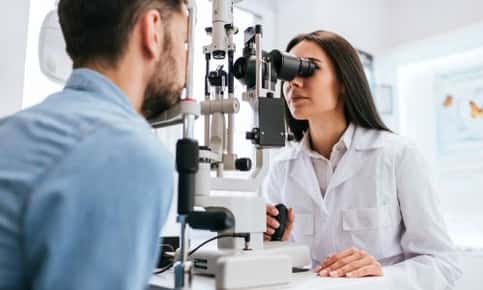
Embrace 20/20 Vision in 2020
Some New Year's resolutions are easier to fulfill than others. Even if you aren't able to add a checkmark to "soar over the Italian countryside in a hot air balloon" this year, but you can certainly improve your vision with a visit to the optometrist in 2020.
How Poor Vision Can Affect Your Life
Even small changes in your vision can have an impact on your life. When you can't see words, images, and objects clearly, you may:
- Develop Uncomfortable Physical Symptoms. Eyestrain, eye pain, headaches, fatigue, and dizziness can occur if you must squint to read or view objects in the distance.
- Have Trouble Driving. Driving safely becomes difficult if you can't read the road signs or tell when the car ahead of you slows down.
- Miss Crucial Information. When you can't see clearly, it's easy to mistake one word for another when you're reading an email, text or recipe. From cooking mistakes to miscommunications with family and co-workers, poor vision can complicate your life.
- Experience Academic Problems. Good vision is an essential aspect of the learning process. Without it, schoolwork can become unnecessarily challenging.
But My Vision Was Fine Last Year!
Vision changes often occur so gradually that you may not be aware that you have a problem until you can't read a line on the eye chart during an eye exam. If you review the past year, you may realize that you compensated for your vision problem by squinting or holding books and papers closer or farther away than normal.
Yearly Eye Exams Help You Improve and Protect Your Vision
Regular eye exams are important no matter what your age. The exams not only detect refractive errors that affect your ability to see clearly but also provide important information regarding the health of your eyes and your general health.
During your eye exam, your optometrist will measure your visual acuity, or ability to see images sharply, by asking you to read an eye chart. If you have a refractive error, you may have difficulty reading some lines on the chart. Common refractive errors include:
- Myopia (Nearsightedness). If you have myopia, close images are clear but far objects look blurry. More than 40 percent of Americans have myopia, according to the American Optometric Association.
- Hyperopia (Farsightedness). The opposite is true if you have hyperopia. Far objects are clear while close images are blurry.
- Astigmatism. Astigmatism makes your vision blurry when you look at objects close up and at a distance and occurs due to an irregularly shaped cornea. Astigmatism can occur in addition to hyperopia or myopia.
- Presbyopia. The age-related condition makes it difficult to see near objects clearly and affects nearly everyone eventually. You can develop presbyopia even if you never needed glasses before. Fortunately, reading glasses, bifocals, trifocals or progressive lenses can help you read and perform close work easily again.
Comprehensive eye exams also include a thorough examination of the structures of your eyes and involve several different types of tests, including glaucoma testing.
Some general health problems cause changes in your eyes that can be detected during a comprehensive eye exam. For example, changes in the appearance in blood vessels in your retina at the back of your eye may mean that you have high blood pressure or diabetes.
Improve Your Vision with Eyeglasses or Contacts
You'll be amazed at the difference in the sharpness of your vision once you receive your new eyeglasses or contact lenses. Even small tweaks to your prescription can make the world around you look much clearer.
When you're ready to choose your new eyeglasses, you'll find plenty of lens and frame options from impact-resistant polycarbonate lenses to ultra-thin high-index lenses to special UV-blocking and anti-reflective coatings, today's lenses are designed to enhance your vision and comfort.
If you plan to wear contacts, you'll need a special exam in addition to your comprehensive eye exam. During the contact lens exam, your optometrist will measure your eyes to determine the lens size you'll need and evaluate your tear film to ensure that you'll be able to wear contact lenses comfortably. Thanks to new types of lenses that retain moisture longer, contacts can be a good choice even if your eyes tend to be a little dry.
Is it time for your eye exam? Contact our office to schedule an appointment.
Sources:
American Optometric Association: Visual Acuity: What is 20/20 Vision?
American Academy of Ophthalmology: What is Presbyopia?, 2/21/19
